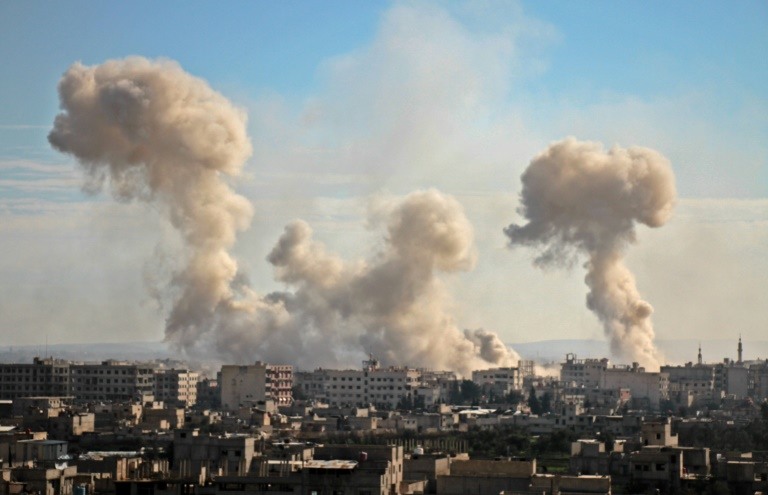
A humanitarian “pause” announced by Russia in Syria’s deadly bombardment of Eastern Ghouta struggled to take hold Tuesday, with fresh violence erupting and no sign of aid deliveries or residents leaving the besieged enclave.
Nine days after Russian-backed regime forces intensified their campaign against the rebel-held enclave, the deal offered some respite to civilians who had been cowering in their basements.
But the first day of a five-hour daily “pause” announced by Russia was marred by fresh violence that saw at least two civilians killed by regime rocket fire.
Moscow’s plan falls short of a broader 30-day ceasefire which was voted by the United Nations but has yet to take effect, and has inspired little trust from among the 400,000 residents of the besieged enclave.
The regime deployed buses at the Al-Wafideen checkpoint to transport residents wanting to use a humanitarian corridor to flee what UN chief Antonio Guterres last called “hell on earth”.
But no civilians ventured towards the regime forces guarding the checkpoint, where large portraits of Syrian President Bashar al-Assad and Russian President Vladimir Putin could be seen side-by-side.
State news agency SANA accused armed groups in Eastern Ghouta of firing several rockets on the path of the corridor declared by Russia to allow for the evacuation of civilians.
– ‘Truce a farce’ –
It singled out the former Al-Qaeda affiliate present in some parts of the enclave, accusing it of trying to prevent civilians from leaving “to use them as human shields”.
Some residents left the basements they had been cowering in for days to check on their property and buy food despite skyrocketing prices in the enclave, besieged since 2013.
But many in the enclave, which lies on the eastern outskirts of the Syria capital, appeared distrustful of the “pause” announced by Damascus’s main ally.
“This Russian truce is a farce. Russia is killing us and bombing us every day,” said Samer al-Buaidhani, a 25-year-old resident of Douma, which is the main town in Eastern Ghouta.
“I don’t believe it’s safe for me or my family to leave by this system,” he told AFP.
More than 550 civilians, almost a quarter of them children, have been killed since february 18 in the Syrian and Russian bombardment of Eastern Ghouta, making it one of the bloodiest episodes of the country’s seven-year-old conflict.
Violence levels were significantly lower on Tuesday as the “humanitarian pause” kicked in but two civilians were killed by rocket fire on the town of Jisreen, according to the Syrian Observatory for Human Rights monitoring group.
Another 16 people were wounded across Eastern Ghouta, the Britain-based group said.
In Hammuriyeh, another town in the sprawling semi-rural enclave, Mohammed Abdullah said the pause left civilians with a choice between two evils.
– Aleppo scenario –
“The truce is not in the people’s interest, we have two options: death or displacement,” said the 30-year-old.
“The campaign we were targeted with was an extermination campaign, not a simple bombardment. What we want is a full and permanent ceasefire for all of Ghouta,” he said.
That sentiment was echoed by the dominant rebel groups in Eastern Ghouta, who sent a letter to the United Nations stating their willingness to expel jihadists as soon as a full ceasefire takes effect.
The Russian-backed daily five-hour “pause” falls short of a broader month-long ceasefire voted by the UN Security Council on Saturday.
The main rebel groups in Eastern Ghouta — Jaish al-Islam, Faylaq al-Rahman and Ahrar al-Sham — declared their “complete commitment to deport” jihadist fighters.
Hayat Tahrir al-Sham, a group made up mostly of fighters from Al-Qaeda’s ex-affiliate Al-Nusra Front, is present in some parts of the enclave.
The letter said such an evacuation, which has been discussed previously but never yielded any result, would take 15 days and start when a UN truce takes effect.
The Syrian government lost control of Eastern Ghouta in 2012 and has besieged it almost ever since.
The main rebel groups have so far rejected Russian-brokered offers to evacuate civilians of any fighters of their own.
The scenario put in place by the regime and its Russian ally was reminiscent of the deal that saw civilians bused out of the northern city of Aleppo in late 2016.
Few civilians initially used the Aleppo corridors unilaterally announced by Russia.
Some started fleeing after renewed bombardment and the rest eventually evacuated when a multilateral deal was reached with Turkey.




